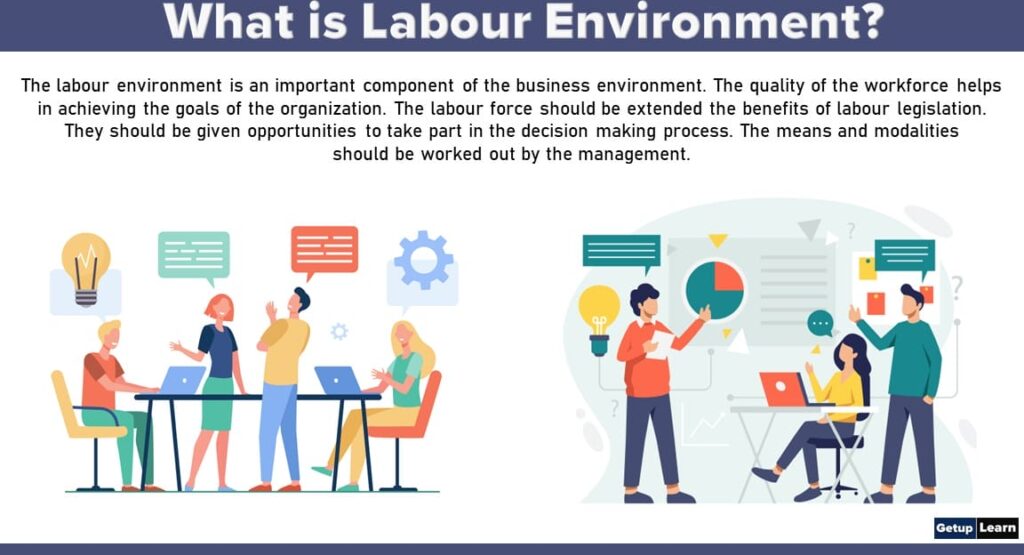Table of Contents
- 1 What is Labour Environment?
- 2 Principles of Labour Legislation
-
3 Classification of Labour Legislations
- 3.1 Laws Related to Industrial Relations such as
- 3.2 Laws Related to Wages such as
- 3.3 Laws Related to Working Hours and Conditions of Service such as
- 3.4 Laws Related to Equality and Women Empowerment such as
- 3.5 Laws Related to Deprived and Disadvantaged Sections of the Society such as
- 3.6 Laws Related to Social Security such as
- 4 Concept of Labour Welfare
- 5 FAQs About Principles of Labour Legislation
What is Labour Environment?
The labour environment is an important component of the business environment. The quality of the workforce helps in achieving the goals of the organization. The labour force should be extended the benefits of labour legislation. They should be given opportunities to take part in the decision-making process. The means and modalities should be worked out by the management.

Labour legislation is the establishment of social justice and has been the principle that has guided the origin and development of labour legislation in India. The setting up of the International Labour Organisation (ILO) gave an impetus to the consideration of welfare and working conditions of the workers all over the world and also led to the growth of labour laws in all parts of the world, including India.
Principles of Labour Legislation
There are some important principles of labour legislation which are given below:
- Principle of Protection
- Principle of Social Justice
- Principle of Welfare
- Principle of Social Security
- Principle of Economic Development
- Principle of International Obligation
Principle of Protection
The principle of protection suggests the enactment of labour legislation to protect those who are not able to protect their interests on their own and also workers, in particular industries against the hazards of industrial processes.
The principle of social justice means the establishment of equality in social relationships. It aims at removing discrimination suffered by specific groups of labour. History is replete with examples where certain groups of society and labour have been subjected to different sorts of disabilities as compared to other groups of workers in general.
Principle of Welfare
Although the protective and social security laws have the effect of promoting labour welfare, special labour welfare or labour welfare laws have also been enacted, with a view to providing certain welfare amenities to workers, and often to their family members also.
One of the outstanding measures to mitigate the hardship is to make available social security benefits under the coverage of social security legislation. Social security legislation may be divided into two broad categories – social insurance legislation and social assistance legislation. In social insurance, benefits are generally made available to the insured persons fulfilling certain eligibility conditions.
In social assistance also, the beneficiaries receive benefits as a matter of right, but they don’t have to make any contributions. The finance is made available by the state or a source specified by the state. Social assistance benefits are generally paid to persons of insufficient means or on consideration of their minimum needs.
Principle of Economic Development
Labour laws have also been enacted keeping in view the need for the economic and industrial development of particular countries. Improvement of physical working conditions, the establishment of industrial peace, provision of machinery for settlement of industrial disputes, formation of forums of workers’ participation in management, prohibition of unfair labour practices, restrictions on strikes and lock-outs, provision of social security benefits and welfare facilities, certification of collective agreements and regulation of hours of work have a direct or indirect bearing on the pace and extent of economic development.
Principle of International Obligation
This principle postulates the enactment of labour laws with a view to giving effect to the provisions of resolutions, adopted by international organisations like ILO, UN and similar other bodies. In general situations, the countries ratifying the resolutions or agreements are under the obligation to enforce them. One of the instruments of doing so is the enactment of laws.
Classification of Labour Legislations
On the basis of specific objectives, the labour legislation in India can be classified into the following categories:
-
Laws Related to Industrial Relations such as
-
Laws Related to Wages such as
-
Laws Related to Working Hours and Conditions of Service such as
-
Laws Related to Equality and Women Empowerment such as
-
Laws Related to Deprived and Disadvantaged Sections of the Society such as
- Laws Related to Social Security such as
- Trade Union Act, 1926
- Industrial Employment Standing Order Act, 1946.
- Industrial Disputes Act, 1947.
- Payment of Wages Act, 1936
- Minimum Wages Act, 1948
- Payment of Bonus Act, 1965.
- Working Journalists (Fixation of Rates of Wages) Act, 1958
- Factories Act, 1948.
- Plantation Labour Act, 1951.
- Mines Act, 1952.
- Industrial Employment (Standing Orders) Act, 1946
- Merchant Shipping Act, 1958.
- Motor Transport Workers Act, 1961.
- Contract Labour (Regulation & Abolition) Act, 1970.
- Sales Promotion Employees Act, 1976.
- Dock Workers (Safety, Health and Welfare) Act, 1986.
- Dock Workers (Regulation of Employment) Act, 1948
- Mines and Mineral (Development and Regulation Act, 1957
- Building and Other Construction Workers Welfare Cess Act, 1996
- Private Security Agencies (Regulation) Act, 2005
- Maternity Benefit Act, 1961
- Equal Remuneration Act, 1976.
- Bonded Labour System (Abolition) Act, 1976
- Child Labour (Prohibition & Regulation) Act, 1986
- Children (Pledging of Labour) Act, 1933
- Workmen’s Compensation Act, 1923.
- Employees’ State Insurance Act, 1948.
- Employees’ Provident Fund and Miscellaneous Provisions Act, 1952.
- Payment of Gratuity Act, 1972.
- Employers’ Liability Act, 1938
- Beedi Workers Welfare Cess Act, 1976
- Beedi Workers Welfare Fund Act, 1976
- Cine Workers Welfare Cess Act, 1981
- Cine Workers Welfare Fund Act, 1981
- Fatal Accidents Act, 1855
- Limestone and Dolomite Mines Labour Welfare Fund Act, 1972
- Mica Mines Labour Welfare Fund Act, 1946 29
- Personal Injuries (Compensation Insurance) Act, 1963
- Personal Injuries (Emergency Provisions) Act, 1962
- Unorganized Workers’ Social Security Act, 2008
The above classification indicates the coverage and range of labour legislation in India. Having a look at the names of the legislations only, you can see the relevance of the principles of labour legislation.
Concept of Labour Welfare
The meaning and implications of labour welfare differ widely with times, regions, industries, countries, social values and customs, the general economic development of the people and the political ideologies prevailing at particular moments. As such, a precise definition is rather difficult.
So we can understand the concept of labour welfare with some of the definitions:
According to Labour Investigation Committee. “Labour welfare is Anything done for the intellectual, physical, moral and economic betterment of the workers, whether by the employers, by the government or by other agencies over and above what is laid down by law or what is generally expected on the part of the contractual benefits for which worker may have bargained.”
According to N.M. Joshi, “welfare work covers all the efforts which employers take for the benefit of their employees over and above the minimum standards of working conditions were fixed under the Factories Act and over and above the provisions of the social legislation providing against accident, old age, unemployment and sickness”.
Labour welfare implies the setting up of minimum desirable standards for the provision of facilities like food, health, clothing, medical assistance, housing, education, job security, insurance, recreation etc. Such facilities enable the worker and his family to lead a good working life, family life and social life.
FAQs About Principles of Labour Legislation
What are the principles of Labour Legislation?
The following are the principles of labour legislation:
1. Principle of Protection
2. Principle of Social Justice
3. Principle of Welfare
4. Principle of Social Security
5. Principle of Economic Development
6. Principle of International Obligation.
What is the classification of labour legislations?
The following is classification of labour legislations:
1. Laws Related to Industrial Relations such as
2. Laws Related to Wages such as
3. Laws Related to Working Hours and Conditions of Service such as
4. Laws Related to Equality and Women Empowerment such as
5. Laws Related to Deprived and Disadvantaged Sections of Society such as
6. Laws Related to Social Security such as.












